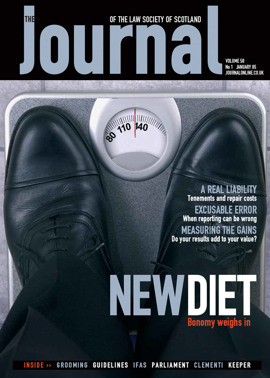What right to be wrong?

Power without responsibility, the prerogative of the harlot, is an epithet aimed at British newspaper proprietors on a regular basis since first applied by Stanley Baldwin to Lord Rothermere. The owners of the Daily Telegraph may beg to differ.
Galloway v Telegraph Group Ltd [2004] EWHC 2786 (QB) was a comprehensive defeat for the newspaper, with the defendants ordered to pay £150,000 in damages for libel and an estimated £1.2 million in costs, with incalculable costs in terms of bad publicity.
The judgment of Mr Justice Eady has been viewed as a setback for press freedom and a reversal of the trend post-ECHR for the media’s freedom of expression to outweigh the individual’s right to protect his reputation. However, perhaps more worryingly, it can also be read as a dangerous precedent in setting judicial standards for “responsible journalism” for the British media, both in word and deed.
The basic facts were not in dispute: the newspaper claimed to have unearthed official documents in post-invasion Iraq which stated that the MP, whose anti-war stance was well known, had received large sums of money from the Iraqi Government, both personally and through a charity which he fronted.
The newspaper did not seek to prove the truth of the allegations contained in the documents, arguing that it ultimately did not have the resources to establish their truth or otherwise, but relied principally on a defence of qualified privilege first established in Reynolds v Times Newspapers [2001] 2 AC 127.
Reynolds was a watershed as it recognised for the first time a right for newspapers to get things wrong. Undoubtedly influenced by the ECHR, the House of Lords found there were particular circumstances of publication which justified newspapers escaping the consequences of printing allegations that transpired to be false.
Hoops to jump through
However, the decision came with health warnings. As a defence for all political reporting it was specifically rejected, and Lord Nicholls set out a long list of the circumstantial factors which require to be present before the defence can apply. These included the nature of the allegations, the credibility of their source, the extent to which there was public concern, the steps taken to verify the allegations, whether the person referred to by the allegations was allowed to comment, and the tone of the article.
Reynolds has been argued successfully by newspapers in a number of English cases where they could not prove allegations they had printed (GKR Karate v Yorkshire Post (No 1) [2000] EMLR 396; Al-Fagih v HH Saudi Research and Marketing (UK) Ltd (2002) EMLR 13). The case has yet to be formally pronounced upon in the Court of Session, but in Adams v Guardian Newspapers Ltd 2003 ScotCS 131 (7 May 2003; BAILII citation) it was common ground between the parties that the Reynolds approach should be followed in Scots law, and Lord Reed proceeded on that basis.
On the basis of the Reynolds checklist, Mr Justice Eady scored the Telegraph very badly. He accepted that the allegations were of a serious nature and would be of public concern, but he did not accept that the paper had either handled them or presented them in a responsible way. Mr Galloway had not been given the opportunity to look at the documents or comment on all the allegations, the article was printed in a “self-imposed haste”, and the allegations were “embraced… with relish and fervour” by the newspaper.
In particular, he was perturbed by the tone of the Telegraph’s coverage, which he described as “dramatic and condemnatory”, by accusing Mr Galloway of “treason” and “treachery”. As a result, he decided the newspaper could not argue that it was merely presenting the allegations, in a neutral way, but had adopted them as fact, and therefore could not claim the latitude allowed to newspapers by Reynolds.
Standards without precedent?
It seems a further test has been added to the Reynolds checklist, with the question of neutrality now having to be decided by judges. The only safe course for newspapers in reporting unproven allegations in future would be to present them in a sensation-free way without any value judgments, academic if not anaemic in tone, with all colour or emotive language being surgically removed.
Given the historically partisan nature of the British press, and the impact of a story like the Galloway allegations, this is not only unrealistic but somewhat dangerous. By use of words such as “treason”, the Telegraph has done no more than spell out the implications of these allegations, and these would have been obvious to most intelligent readers in any event. Is there a danger that imposing a judge’s view of neutrality could act as a form of censorship of the blindingly obvious?
However, Mr Justice Eady’s test of neutrality goes well beyond the language in the finished articles. He takes account of internal memos between staff, which were never intended for publication. He also assesses the behaviour and the decisions taken by the newspaper staff prior to publication. Again, he disapproves.
As he comments on one of the newspaper’s witnesses, “He seemed to think that The Daily Telegraph was covering the story neutrally. Although it may seem strange, I decided that he genuinely believes that now. He is not the only Daily Telegraph witness to be deluding himself in this respect.”
The “self-imposed haste” he refers to is something which no doubt the Telegraph will now be repenting at leisure, but it is rather uncomfortable to hear judgment being passed with the benefit of 20/20 hindsight on the decision to run the story. The documents were apparently found by an experienced reporter at an Iraqi Government office, and their contents were, in news terms, explosive. In a competitive newspaper industry, during a period where foreign correspondents from all newspapers were retrieving all sorts of information from liberated Baghdad, how many editors would have been prepared to sit on such a story? Given the documents ultimately could not be verified, what would have been gained by sitting on such a story? Is it not preferable, in a democratic society, for such allegations about an MP to be printed in some form, than not at all?
There was clear evidence that the newspaper put most, if not all, the allegations to Mr Galloway prior to publication, and his very firm denial to all of them was given some prominence in the coverage. It can be presumed he would also have denied other allegations, had they been put to him. The denial included his initial view that the documents were forgeries. But this was not deemed sufficient by Mr Justice Eady. What practical difference, therefore, would it have made had he been allowed time to inspect the documents, other than to allow him to state with greater certainty his view that they were forgeries?
Courts at the controls
In attempting to create an artificial standard of “responsible journalism”, there are obvious implications for freedom of speech. In future, reporters may require to consider whether they will have to reveal to a court how they obtained information. Editors may require to have set-down procedures for handling stories, and any departure from these could be founded upon. Legal advice may have to be taken on the content of internal memos.
It is not difficult to envisage the imaginary “industry standards” which the Telegraph fell short of in Galloway, being referred to in other cases where newspapers are in court, such as other cases of defamation, or contempt of court, and certain inferences being drawn. In time, by creeping increment, what is required to pass the Reynolds test could become the expected standard for all newspapers, in all cases.
How ironic that a case brought by one of our more left-wing politicians may result in the state ultimately being given greater scope to interfere in how the media operates. Since before Baldwin’s time, our politicians have repeatedly attempted, and often failed, to impose control on newspapers by means of legislation. As is often his wont, Mr Galloway may have shown there is more than one way to skin a cat.
Stephen Smith is a media lawyer with Bannatyne Kirkwood France & Co, and a former journalist
In this issue
- Riding the wave of change
- Last stand for the defence
- Losing the wait
- What right to be wrong?
- Prevention as the cure
- No room for half measures
- Poles apart
- Get IT right
- The value proposition
- A time for resolution
- When it falls, it falls
- Round the houses
- Private bills and public interest
- Charging Peter to pay Paul
- Fair pay for liquidators
- Website reviews
- Book reviews
- Fair notice?
- The new title conditions






